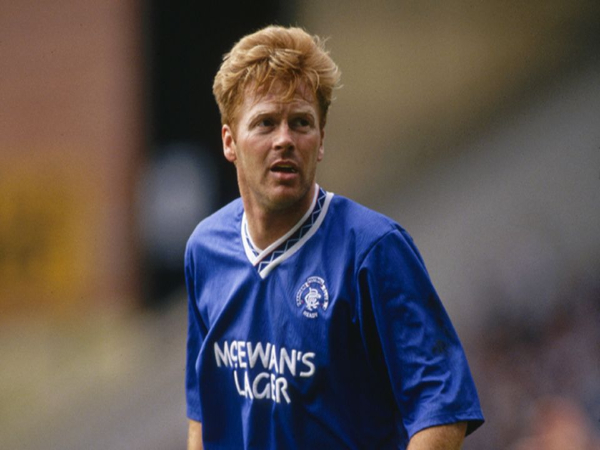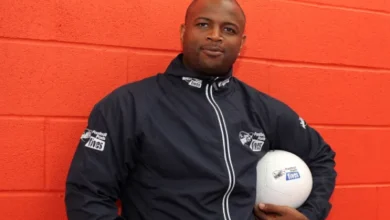Maurice Johnston: The Controversial Football Legend Who Changed Scottish Football Forever
Unveiling the life, legacy, stats, and impact of Maurice Johnston, the man who defied norms and rewrote football history.

Maurice Johnston, often referred to as Mo Johnston, is a name that echoes through the corridors of Scottish football history. Known for his goal-scoring prowess, fearless decisions, and record-breaking career, Johnston is more than just a footballer—he’s a cultural icon who defied sectarian boundaries. From his early days at Partick Thistle to the historic move that shocked both sides of Glasgow, Johnston’s story is one of courage, controversy, and sheer footballing brilliance.
Early Life and Football Beginnings
Maurice John Giblin Johnston was born on April 13, 1963, in Glasgow, Scotland. Growing up in a working-class family, Johnston showed a passion for football from a young age. His early days were marked by street games and youth club participation, where his natural talent for scoring goals quickly set him apart. His professional journey began with Partick Thistle in 1981, where he made an immediate impact with his striking ability and keen sense of positioning.
Rise to Prominence: Watford and Celtic Years
Johnston’s move to Watford in 1983 marked his first big step into top-flight football. Under the management of Graham Taylor, Johnston flourished. He scored 23 league goals during his time at the club and played a pivotal role in Watford’s journey to the 1984 FA Cup Final. His performances caught the attention of larger clubs, and in 1984, he returned to Scotland to sign with Celtic.
At Celtic, Johnston became a fan favorite almost instantly. With 72 goals in 128 matches, he was instrumental in helping the team secure the Scottish Cup in 1985 and the Scottish League title in 1986. His ability to perform in high-pressure situations and his knack for finding the back of the net made him one of the most lethal forwards in Scottish football at the time.
The Controversial Move: Rangers Signing
Perhaps the most defining moment in Maurice Johnston’s career came in 1989, when he signed with Rangers—a move that sent shockwaves through Scottish football. Johnston had already agreed in principle to return to Celtic, but in a dramatic turn of events, he was unveiled as a Rangers player. What made this move particularly controversial was Johnston’s Catholic background and his previous ties with Celtic, two aspects that clashed with the sectarian divisions historically associated with Rangers.
This groundbreaking transfer made Johnston the first high-profile Catholic to play for Rangers since World War I. While the decision alienated some fans from both sides, it also served as a turning point in breaking down religious and cultural barriers within Scottish football. During his time at Rangers, Johnston scored 46 goals in 100 appearances and won two Scottish league titles.
International Career with Scotland
Johnston’s international career was equally impressive. He earned 38 caps for the Scotland national team between 1984 and 1991, scoring 14 goals. One of his most memorable moments came during the 1990 FIFA World Cup, where he scored a penalty against Sweden. His aggressive playing style and clinical finishing made him a valuable asset for the national squad, despite the occasional controversy surrounding his club affiliations.
Maurice Johnston Stats: By the Numbers
- Partick Thistle (1981–1983): 14 goals in 47 appearances
- Watford (1983–1984): 23 league goals
- Celtic (1984–1987): 72 goals in 128 appearances
- Nantes (1987–1989): 22 goals in 66 appearances
- Rangers (1989–1991): 46 goals in 100 appearances
- Everton, Hearts, Falkirk (1991–1996): Modest contributions across these clubs
- Kansas City Wizards (1996–2001): 31 goals in 149 appearances
Life in the MLS and Coaching Career
In the twilight of his career, Johnston made a significant move to the United States to play for the Kansas City Wizards in Major League Soccer (MLS). He brought experience and leadership to the fledgling league, scoring 31 goals in 149 appearances. After hanging up his boots, Johnston transitioned into coaching and management. He served as the head coach and later the director of football for the Kansas City Wizards, contributing to the development of soccer in America.
Maurice Johnston Family and Personal Life
Maurice Johnston has kept much of his personal life out of the public eye, preferring to let his football do the talking. He is married and has children, though details about his family remain relatively private. What is known, however, is that his family has been a pillar of support throughout his tumultuous and high-profile career. His ability to remain grounded despite the media frenzy surrounding him speaks volumes about the role his loved ones have played.
Maurice Johnston Wiki and Wikipedia Presence
Maurice Johnston has a well-documented online presence, particularly on platforms like Wikipedia. His page is regularly updated with career stats, historical milestones, and details about his controversial transfer to Rangers. The “Maurice Johnston Wikipedia” entry serves as a comprehensive source of information, detailing his club and international career, honors, and off-the-pitch contributions. However, his legacy extends far beyond what’s written on any single webpage.
Legacy and Cultural Impact
Johnston’s legacy is deeply intertwined with the evolution of Scottish football. He is remembered not just for the goals he scored, but for the boundaries he broke and the conversations he started. His transfer to Rangers forced a nation to confront its sectarian biases and paved the way for greater inclusivity in the sport. His courage in making such a decision, knowing the backlash it would generate, cements his place as one of the most impactful figures in Scottish football.
Beyond the controversy, Maurice Johnston’s skill on the field was undeniable. He had the ability to change games single-handedly, to inspire teammates, and to rise to the occasion when it mattered most. His contributions to clubs across Scotland, France, England, and the United States showcase the universal nature of his talent.
Conclusion
Maurice Johnston is a name that evokes strong reactions, and rightly so. He was a player who dared to be different, who challenged societal norms, and who delivered exceptional performances throughout his career. From his early days at Partick Thistle to his influential presence in the MLS, Johnston’s journey is one of resilience, talent, and transformation. For anyone looking to understand the man behind the headlines, it’s clear that Maurice Johnston was more than just a footballer—he was a trailblazer who changed the game forever.



